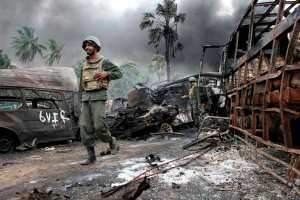 The end of nearly three decades of bloody civil war and the unexpected emergence of a serious challenger to the president’s political dominance were the biggest developments in Sri Lanka this year. But what happens in 2010 will be crucial, as a lasting peace – and the economic dividend many are hoping for – is far from certain.
The end of nearly three decades of bloody civil war and the unexpected emergence of a serious challenger to the president’s political dominance were the biggest developments in Sri Lanka this year. But what happens in 2010 will be crucial, as a lasting peace – and the economic dividend many are hoping for – is far from certain.
This was a momentous year for Sri Lanka, starting from the time fighting between government troops and Tamil rebels escalated, and the standoff between the government and international community over human rights violations, to the economic crisis, which led to a bailout by the International Monetary Fund (IMF), and the presidential election campaign.
Perhaps the biggest question is will peace last, now that the Tamil north has been secured? “Peace is a sine qua non to end the ethnic issue but the government has not been able to achieve this so far,” said Parakrama Dissanayake, the chairman of Aitken Spence Shipping in Colombo.
Close to 100,000 people died in the conflict after disgruntled young Tamils took up arms in the early 1980s, saying their community was being discriminated against by the ethnic Sinhala-dominated government. The revolt initiated three decades of fighting by Tamil separatists, who coalesced as the Liberation Tigers of Tamil Eelam, until it came to an end in May with their defeat.
Now, the two men widely credited with being responsible for the state’s victory – President Mahinda Rajapaksa and his now retired army commander, Gen Sarath Fonseka – are pitted against each other as the main candidates in the January 26 presidential poll.
Wijedasa Rajapaksa, a former minister and an opposition parliamentarian, said the rift between the president and Gen Fonseka had to do with war “credits”. “Fonseka says politicians are taking credit for a war won by the soldiers while Rajapaksa says it’s his political leadership that won the war.”
Fears of terrorist attacks on the capital Colombo have all but evaporated after the rebels were defeated. There hasn’t been a single attack since, paving the way for the first Christmas in three decades that will be celebrated without fear of violence.
However, a hitherto unknown group calling itself the People’s Liberation Army (PLA), which boasted links to the Palestine Liberation Organisation and Cuba, said it would continue attacks on government targets. The Times of London reported earlier this month that the group had Marxist leanings and was preparing to mount a new insurgency in Sri Lanka.
The report said the PLA was founded in eastern Sri Lanka and had vowed to launch attacks against government and military targets unless its demands for a separate Tamil homeland are met. “This war isn’t over yet,” Commander Kones, head of the PLA’s Eastern District military command, was quoted as saying.
Government officials quickly rejected the claims while spokespeople from the Palestinian and Cuban embassies in Colombo refuted any connections with the group.
“There is no such group. It’s just LTTE [Tamil Tiger rebel] propaganda,” said Professor Rohan Gunaratne, the head of a terrorism think tank at Nanyang Technological University in Singapore. Since the Times article, there have been no further statements by the PLA.
Concerns also remain over the relaxing of restrictions on the media, imposed by the government during the civil war. This year, President Rajapaksa has been under severe pressure from the international community and international human rights groups over media repression, attacks on journalists and civilian casualties during the last few weeks of the civil war. Since 2004, when the current ruling United People’s Freedom Alliance came to power, 33 journalists and media workers have been killed, according to media groups.
Sri Lankan journalists in exile, who formed the Journalists for Democracy in Sri Lanka, said in a statement in July that more than 50 journalists and media workers have left the country for fear of political persecution.
The government has resisted international pressure to respond to claims of war crimes, which may have been partially responsible for its loss of a key trade concession when the European Union last week announced that it was temporarily suspending tax-free trade benefits to Sri Lanka next year for failing to implement UN conventions on human and labour rights.
Sri Lanka’s international trade minister, Gamini Peiris, told reporters this week that the government planned to complain to the World Trade Organisation over the unfairness of the decision, which could result in thousands of workers being unemployed.
Nihal Sri Ameresekera, a chartered accountant who has filed many cases in courts over corrupt deals involving government officials, says while terrorism has been brought under control, its after-effects remain.
“The war may be over but the rights of the people are yet to be restored. There is no freedom of movement as security checkpoints are still on the streets and people are fearful of speaking out,” he said, adding that the cost of living has skyrocketed this year.
(For updates you can share with your friends, follow TNN on Facebook and Twitter )
